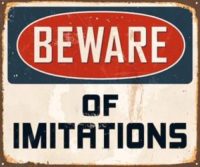Global counterfeiting is expected to reach $1.82 trillion by 2020.1 Counterfeiting includes, but goes way beyond, fake watches or bogus polo shirts. In fact, no product is safe, including cannabis.
Counterfeiting is insidious; it supports child labor, human trafficking, organized crime, and has been linked to terrorist groups.2 “[C]ounterfeit good sales have been linked to al-Qaeda, FARC, Colombia’s rebel army and paramilitary groups in Northern Island.” 3 The FBI believes that counterfeit goods financed the World Trade Center bombing and the attack on September 11, 2001.4
Counterfeiters and their fake merchandise are typically difficult to locate and remove from the marketplace. Currently, we are seeing a proliferation of counterfeiting in the cannabis industry. Cannabis companies must consider the impact that counterfeit products have on their brand and goodwill. It is vital for cannabis companies to implement strategies to combat counterfeiting.
 Typically, companies use trademark laws to combat counterfeiters. However, brand protection for cannabis companies is difficult because trademark laws do not provide the breadth of protection needed to successfully protect and enforce a cannabis company’s brand. Currently, U.S. trademark laws prohibit the registration of cannabis trademarks because selling cannabis violates federal law.5 While the 2018 Farm Bill amended this steadfast rule slightly, it only applies in limited circumstances, i.e., when the cannabis product contains less than 0.3% THC.6 As a result, cannabis companies are forced to seek protection through indirect registration, namely filing for goods and services that are not cannabis-related, such as clothing, publications or medical services. Indirect registrations are not enough to combat counterfeiters successfully.
Typically, companies use trademark laws to combat counterfeiters. However, brand protection for cannabis companies is difficult because trademark laws do not provide the breadth of protection needed to successfully protect and enforce a cannabis company’s brand. Currently, U.S. trademark laws prohibit the registration of cannabis trademarks because selling cannabis violates federal law.5 While the 2018 Farm Bill amended this steadfast rule slightly, it only applies in limited circumstances, i.e., when the cannabis product contains less than 0.3% THC.6 As a result, cannabis companies are forced to seek protection through indirect registration, namely filing for goods and services that are not cannabis-related, such as clothing, publications or medical services. Indirect registrations are not enough to combat counterfeiters successfully.
Fortunately, there is another avenue that cannabis companies should be using to protect and enforce their brands against counterfeiters — obtaining copyright registrations for the company’s logo, product packaging and, if appropriate, company name. Copyright protection extends to a protectable work regardless of whether the copyright is in an illegal work or the copyright owner uses its copyright for an illegal purpose.7 Moreover, if there is pending or prospective litigation, a brand owner may request special handling of a copyright application to obtain expedited processing.8 If the application meets all the requirements for registration, special handling will result in the brand owner obtaining a copyright registration in about a week.9 Trademark registrations, on the other hand, typically take at least five months to obtain.
Once a company receives a copyright registration, the Copyright Act provides unique and important avenues for relief against counterfeiters.10 For example, a brand owner may obtain an ex parte seizure order, which allows the company to enter the counterfeiter’s premises, without notice, and seize the counterfeit products, business records, financial information relating to the counterfeit operation, customer and vendor lists, and bank account information.11 A brand owner may also obtain injunctive relief — a court order prohibiting the counterfeiter from buying, selling, and advertising counterfeit products — and freeze the counterfeiter’s bank accounts.12
People often say that imitation is the sincerest form of flattery. However, in the counterfeiting context, imitation can be lethal to your company.A cannabidiol (CBD) company recently used its copyright registrations to stop counterfeiters from advertising and selling counterfeit CBD gummies and oils. The CBD company obtained an ex parte seizure order, injunction and asset freeze, and obtained a $5 million judgment against the counterfeiters.13
Litigation is a valuable and effective tool in fighting counterfeiting. It helps protect the company’s goodwill, enhances consumer confidence and increases the company’s revenues. There are other tools that should be used to combat counterfeiting.
Companies must diligently watch their vendors, distributors, and customers for bad actors. Your vendor agreements should include provisions allowing regular audits and inspections. Your distribution agreements should prohibit distributors from selling outside their territory and engaging in price arbitrage. Your customers should be prevented from selling your products in smaller units. Having unique packaging with holograms will also assist in reducing counterfeits as the packaging is harder to replicate. An effective public relations campaign that includes educating your customers and the industry on the harmful effects of buying counterfeit cannabis products is also a very effective tool.
People often say that imitation is the sincerest form of flattery. However, in the counterfeiting context, imitation can be lethal to your company. Counterfeit cannabis products can be subpotent, superpotent or contaminated. Having these dangerous products advertised under your brand in identical packaging can have dire consequences.
If you are not currently experiencing a counterfeiting problem, you likely will. It is important to be proactive and find attorneys that have experience combatting counterfeiters in the cannabis industry to help protect your brand and company.
References
- Global Brand Counterfeiting Report 2018-2020 – ResearchAndMarkets.com, AP News (May 15, 2018), https://www.apnews.com/ef15478fa38649b5ba29b434c8e87c94.
- Colleen Jordan Orscheln, Bad News Birkins: Counterfeit in Luxury Brands, 14 J. Marshall Rev. Intell. Prop. L. 249, 259 (2015).
- Id. at 260.
- Id.
- Examination of Marks for Cannabis and Cannabis-Related Goods and Services after Enactment of the 2018 Farm Bill, USPTO (May 2, 2019), https://www.uspto.gov/sites/default/files/documents/Exam%20Guide%201-19.pdf.
- Id.
- See, e.g., Flava Works, Inc. v. Gunter, 689 F.3d 754, 756 (7th Cir. 2012); Dream Games of Ariz., Inc. v. PC Onsite, 561 F.3d 983 (9th Cir. 2009); Mitchell Bros. Film Grp. v. Cinema Adult Theater, 604 F.2d 852, 855 (5th Cir. 1979); Big Daddy Games, LLC v. Reel Spin Studios, LLC, No. 3:12-cv-00449, 2013 WL 12233949, at *16–17 (W.D. Wis. Apr. 10, 2013).
- Special Handling, U.S. Copyright Office, https://www.copyright.gov/help/faq/faq-special.html (last visited November 20, 2019).
- Id.
- See 17 U.S.C. § 503(a)(3).
- Id.
- Id.
- See Global Widget, LLC v. A.R.T. Wholesale LLC, No. 1:19-cv-02136, 2019 WL 3281321 (N.D. Ga. May 16, 2019); Global Widget, LLC v. A.R.T. Wholesale LLC, No. 1:19-cv-02136, 2019 WL 3244489 (N.D. Ga. July 18, 2019).



